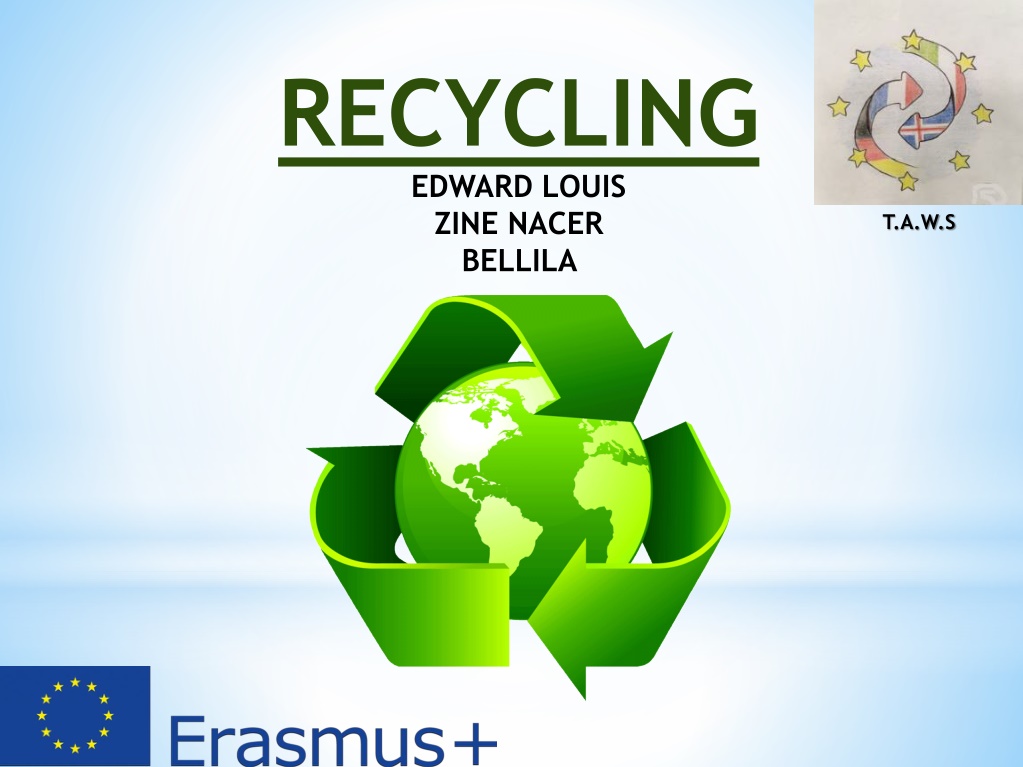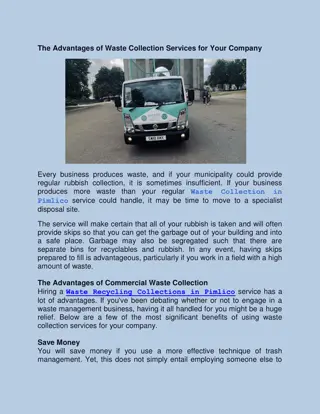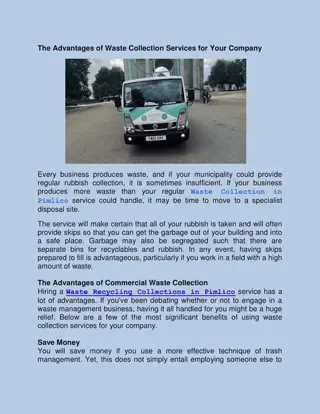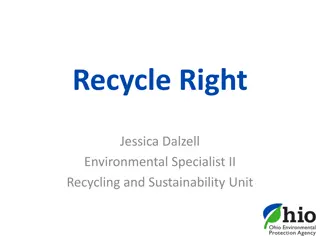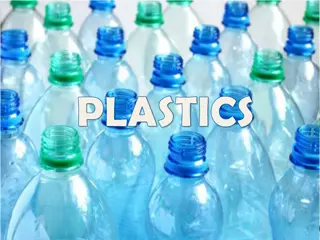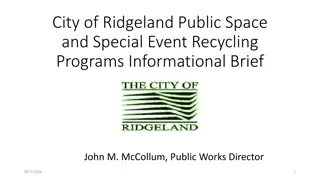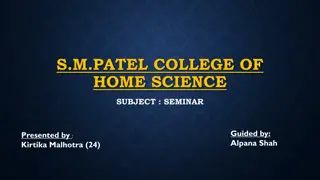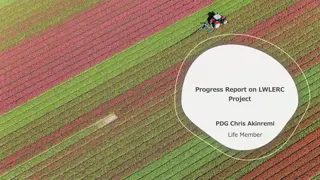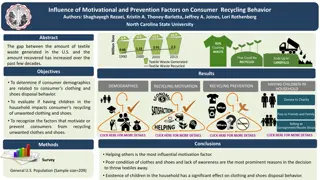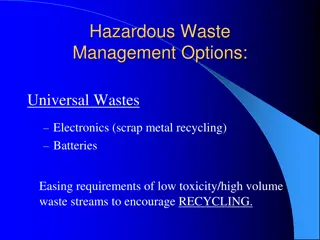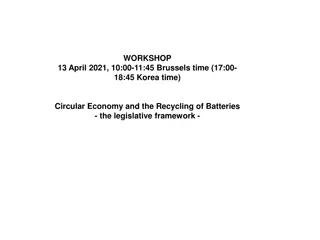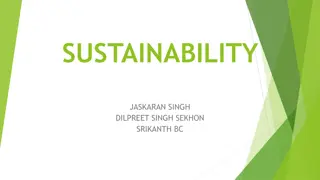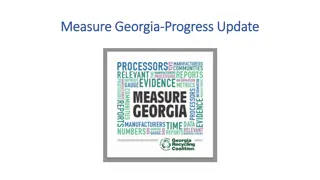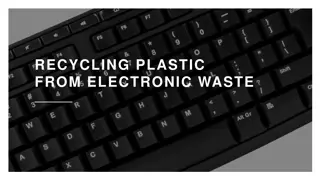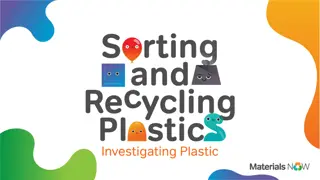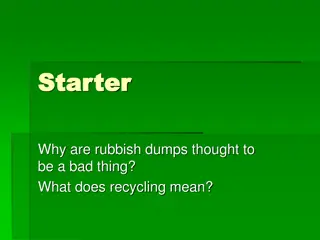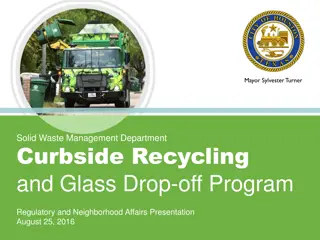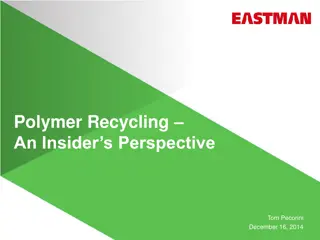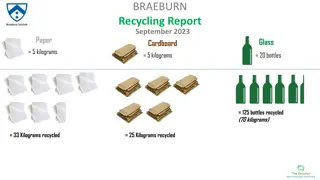Evolution of Recycling Practices Through History
Recycling has evolved over time from waste disposal in nature during prehistory to organized sorting by households and environmental regulations in modern times. The process of converting waste materials into new products helps reduce pollution, conserve resources, and create a sustainable environment. Various techniques like chemical recycling are employed to manage different types of waste effectively.
Download Presentation

Please find below an Image/Link to download the presentation.
The content on the website is provided AS IS for your information and personal use only. It may not be sold, licensed, or shared on other websites without obtaining consent from the author. Download presentation by click this link. If you encounter any issues during the download, it is possible that the publisher has removed the file from their server.
E N D
Presentation Transcript
RECYCLING EDWARD LOUIS ZINE NACER BELLILA T.A.W.S
Recycling is the process of converting waste materials into new materials and objects. The recycling allows to reduce the volumes of waste, their pollution and also to protect natural resources by reusing objects already used, examples : plastic bottles, many kind of glasses, electronics, metals...
In many countries, the autorities help households with bin bags with label on them. Households then sort out the waste themselves and place them in the right bags for collection.
At the time of the prehistory, people throw their waste in the nature. In Antiquity, the inhabitants take their waste and animals bodies outside of the city. Also in Roma or in Athens they install public toilet.
During Middle Ages, people used to throw their garbage in the streets or the rivers, causing diseases. In Renaissance, a lot of contagious diseases were propagated. Every house had to possess a hole to bury their garbage.
In the 18thcentury, a new job is created: Chiffonnier . They collect broken objects and they transform it. In the 19thCentury, people become aware of the importance of the hygiene. They build drinking water systems and sewers.
In 1975, in France, municipalities have to collect and eliminate the waste of the inhabitants. The one who pollutes have now to pay. Since 1992, according to the legislation, companies have to help consumers not to pollute and to eliminate packaging wastes. They install sorting bins.
3 big families of techniques of recycling : *Chemical : recycling uses a chemical reaction to handle waste. For example : to separate certain components.
* Mechanical : Processing of waste by means of machine. For example : to crush or to separate by Eddy currents : an electric current induced by an alternating magnetic field.
*Organic : Recyling consist after composting or fermentation in producing fertilizers of fuel such as the biogas. The recycling is depending on the type of waste.
The operation of waste recycling begins with the collection of waste in dumpsters or bins to transport them to the sorting centre.
Once sorted out, waste is taken care by processing plants. They are integrated into the chain of transformation which is specific them. They enter the chain in by their original form and go out of it in the form of material ready for the employment.
Once transformed, raw materials stemming from the recycling are used for the manufacturing of new products which will be proposed to the consumers. At the end of their life, these products will be probably thrown, and some of them can be again got back and recycled.
A few recycling companies PAPREC France : It is a french company of recycling founded in 1994 by Jean-Luc Petithuguenin. Its head office is in La Courneuve, France. Paprec Group is one of the main french actors of the recycling, the processing and the valuation of waste.
MTB : More Than Business :The company MTB was created in 1981 by Francis Sevilla. This company is active all around the world : North America, Brazil, Europe, MENA They have reliable machines to satisfy industrial needs.
References: http://www.mtaterre.fr/dossiers/tout-comprendre-sur-le-recyclage-du- papier/pourquoi-est-il-important-de-recycler http://www.clerverts.fr/rubrique.php?Rubrique_id=1&Rubrique_libelle=Le%20 compostage https://fr.wikipedia.org/wiki/Recyclage http://www.ecoemballages.fr/juniors/du-tri-au-recyclage http://www.cedre.info/comprendre-le-recyclage/comment-recycler-les- dechets/ http://www.ademe.fr/expertises/dechets/passer-a-laction/valorisation- matiere/dossier/recyclage/chaine-recyclage-produit-produit-passant-dechet http://www2.istp.org/studentscorner/studentcorner2000_2001/cm1valerie/r ecyclage/recyclageverre/recyclageverre3.html
